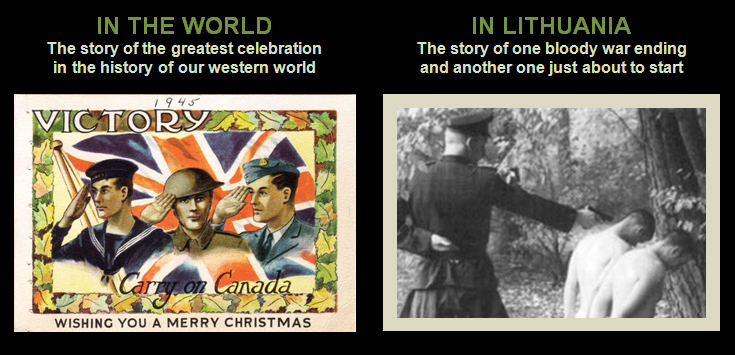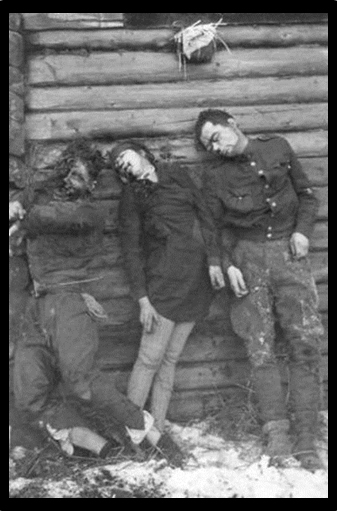
THE VOICE OF INTERNATIONAL LITHUANIA
|
VilNews has its own Google archive! Type a word in the above search box to find any article.
You can also follow us on Facebook. We have two different pages. Click to open and join.
|

2nd World War was over
- though not in Lithuania

Christmas of 1945 was over most of the world celebrated with a joy and delight almost never before seen. Young and old gathered in homes, on streets and in churches. An endless series of victory ceremonies took place in almost every corner of the world. With a deep sense of joy and gratitude all wanted each other warm, comfortable and relaxing Christmas holidays, knowing that the Nazi era was over and that the world now more than ever could look forward to a future of peace and prosperity. The war had finally released the grip, forgotten was the economic recession of the 1930s. Forgotten was also our Western World’s close friends and neighbours - the Baltic States.
On a small farm in northern Lithuania, in the outskirts of the village Šilagalis, Christmas 1945 is nearing. It is the 22nd of December, and the mother of the house feels very happy that her 21 year old son Povilas has finally come home to visit after having been away for many months.
He has come to change into dry clothes to keep him warm through the cold winter days waiting. His mother is infinitely happy to have her son home this one day, and she does everything she can to treat him with all the good food and drink their little farm can produce. You never know how long it will be till next time.
Povilas had joined a local partisan group earlier in 1945, and now spends all time in the North Lithuanian forests where the local "forest brothers" have established their hideouts. It is from these caches, usually at night, that they conduct their operations against military installations and forces of the Soviet Red Army and NKVD (the secret Soviet police that later changed name to KGB).
The Soviet occupation of Lithuania has lasted for more than a year now, but Povilas and other forest brothers still hope that their constant needle sticks can get Josef Stalin to pull his troops out of Lithuania and the other two Baltic countries.
Povilas is pleased to finally have got a day off, not least is he happy to eat real Christmas food and enjoy some Christmas cheer with the family. A small fly in the ointment is the fact that his father, little sister and little brother are not home.
Both the brother and the sister go to a boarding school in the nearest town, Panevežys, and his father had early in the morning that same day left for the town to bring them home for Christmas. But his mother is here, and when she and he, with arms around each other, go out in the barn to feed the animals, he sings with joy a song he so often has sung in the partisan camp in recent months:
"Dying young is difficult, but not for my country. For my country, Lithuania, I am ready to sacrifice my young life. "
His mother scolds him motherly strictly that he sings: "You know it is not proper to sing now that it's Advent," she says. Lithuania's Roman Catholic Church is strict when it comes to how to behave through the various festive times of the year, and his mother admonishes her son, therefore, while at the same time feeling proud and happy that he makes such an honourable service to the home country.
Back in the farmhouse they suddenly hear that the dog starts to bark. Through the window they see a group of soldiers approaching. The soldiers are still on some distance, so Povilas has time to hide in a small cellar room they have made beneath the living room floor, and the mother has time to cover the cellar hatch as best she can.
The cellar room has also previously been used to hide partisans, and both think this is a safe hiding place until the soldiers have left again.
The mother walks out into the yard to meet the soldiers from the Soviet Red Army. They ask if her son is home, and if he, in case, is alone. Without waiting for an answer, they storm into the house and begin to turn upside down on furniture and fixtures. Then they start shooting down to the floor to see if it can be cavities under the floorboards. It takes some time before they discover the cellar hatch, but as soon as they find and open it, they fire a machinegun volley into the hole. It does not take long before they pull the now perforated and lifeless body of Povilas out of the basement. The whole operation has taken them five hours, but they have found what they sought. One more young Lithuanian life has been lost in the desperate struggle against the overwhelming odds.
The distance from the farm to the road is over 500 meters, so the soldiers find a chain in the barn so they can tow the corpse of Povilas across the fields over to the military vehicle waiting. The mother is forced to follow, and soon they are on their way to the NKVD headquarters in Panevezys, where the body of Povilas is thrown out in the middle of the courtyard. His mother is brought to a prison cell in the basement.
Early next morning, Christmas Eve 1945, the mother is brutally dragged up from the wooden bench she has laid sleepless on during the night. Today, and every subsequent day for two weeks, she is brought up to ever-new interrogations, walking across the courtyard where the mutilated body of her son still is lying.
Christmas and New Year holiday season in 1945 passes with this terrible routine for a mother in tears and sorrow. Early in January, she is released and can finally go home and tell the family what has happened.
In thousands of homes around the world happy families walk around their Christmas trees. They celebrate that Jesus is born and the world's evil is overcome. 1946 is the beginning of the new and bright times for the human kind…
In northern Lithuania the parents of Povilas and other parents finally find out where the bodies of their killed young partisan sons have been dumped. Under the cover of dark nights in early January 1946, they manage to bring the bodies of their children home to secret burials in their hometown cemeteries.
Christmas 1945 is over. Most of the world looks forward to many good years of peace, freedom and economic growth. The Baltic States' ten-year guerrilla war against the occupiers has just begun.
* * *![]()
The story of Povilas is real. It is based on a passage from the book "Lithuania's struggle for freedom" (Lithuanian Partisans' War Chronicles).
Povilas Peleckas was born on 24 January 1924 into a farming family in the village of Šilagalis in the Panevežys district north in Lithuania. He attended Šilagalis primary school. Later he helped his parents on the farm. In 1944 when the USSR invaded and occupied Lithuania for the second time (first time was in 1940), Povilas was due for conscription into the Red Army. He refused to go. When a local partisan unit was formed, led by Major Januškevičius, Povilas joined the fighters. In September 1945 many of the members of the unit were killed in battle, and another three were killed at the beginning of December. Those who remained alive determined to join a larger partisan unit. But fate was against them.
|
“Across America, people crowd churches praying with gratitude for the peace in place, and reach out to wounded veterans, children who lost fathers, and neighbors who lost sons. Americans in big cities and small, participate in displays of the intrinsic love so indicative of the American spirit.” |
In 1944-45 Lithuanians were forced to realize that the bloody World War II had been replaced by a new war, the longest and bloodiest guerrilla war in modern European history, lasting from 1944 to at least 1953. |
- Bookmark :
- Digg
- del.icio.us
- Stumbleupon
- Redit it
VilNews e-magazine is published in Vilnius, Lithuania. Editor-in-Chief: Mr. Aage Myhre. Inquires to the editors: editor@VilNews.com.
Code of Ethics: See Section 2 – about VilNews. VilNews is not responsible for content on external links/web pages.
HOW TO ADVERTISE IN VILNEWS.
All content is copyrighted © 2011. UAB ‘VilNews’.

 Click on the buttons to open and read each of VilNews' 18 sub-sections
Click on the buttons to open and read each of VilNews' 18 sub-sections 




